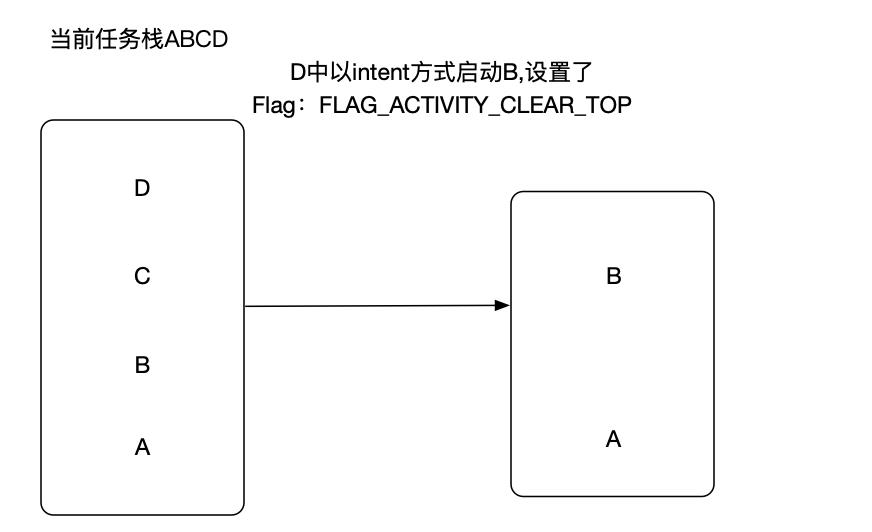FLAG_ACTIVITY_CLEAR_TOP和singleTask的区别
Posted hymKing
tags:
篇首语:本文由小常识网(cha138.com)小编为大家整理,主要介绍了FLAG_ACTIVITY_CLEAR_TOP和singleTask的区别相关的知识,希望对你有一定的参考价值。
Activity的Flags的设置,可以让Activity的运行具有一些特殊的特性,比如有些可以产生和启动模式相同或相似效果的,还有比如Activity在非前台的时候,也不会保存后台的历史列表中。
本文重点分析FLAG_ACTIVITY_CLEAR_TOP,也简单介绍一下其它几个常用的Flag以及使用场景
-
FLAG_ACTIVITY_NEW_TASK
将Activity指定为singleTask的启动模式,效果和在xml中指定启动模式是一样的,同时指定的话,java代码设置高于xml文件配置。 -
FLAG_ACTIVITY_SINGLE_TOP
将Activity指定为singleTop启动模式,效果和在xml中指定启动模式是一样的,同时指定的话,java代码设置高于xml文件配置。 -
FLAG_ACTIVITY_EXCLUDE_FROM_RECENTS
具有此标记位的ACTIVITY不会出现在历史ACTIVITY的列表中,当某些情况,我们不希望用户通过历史列表回到我们的ACTIVITY的时候,这个标记比较有用。他等同于在xml指定ACTIVITY的属性android:excludeFromRecents=“true”。关于这个属性,我在早期做开发的时候,还真有这么一个使用场景,实现的一种类似插件化的方案,就是借助这个属性的设置去完成的。
场景大概是这样:我们的app里面需要一个视频编辑的功能,但是视频编辑呢,大家都知道要使用FFMPEG的库,这个包体大小10M以上,但是我们的主app只有5M,突然增加10M,对市场渠道投放的单本会影响很大。为了解决这个问题吧,只能插件化,当时呢,我们并没有使用什么插件化方案,而是单独把频编辑工具打包成apk,然后主apk用户注册成功后,进行下载安装。这样用户在使用我们的app的时候,如果也打开了视频编辑工具Apk,那么Activity的历史列表中,也会存在。
为了解决这个问题,我们就把视频编辑工具的apk的Activity设置成这个属性。 -
FLAG_ACTIVITY_CLEAR_TOP
具有此标记的Activity被启动后,位于其上的所有Activity都会出栈。但是这个描述是字面含义,我们需要真正理解它。接下来我们看一下官方的解释:
If set, and the activity being launched is already running in the current task, then instead of launching a new instance of that activity, all of the other activities on top of it will be closed and this Intent will be delivered to the (now on top) old activity as a new Intent.For example, consider a task consisting of the activities: A, B, C, D. If D calls startActivity() with an Intent that resolves to the component of activity B, then C and D will be finished and B receive the given Intent, resulting in the stack now being: A, B.
这段大概描述的意思是如图所示:

但是,“instead of launching a new instance of that activity” 说明,结果集里面的B已经不在是上一个任务栈ABCD里面的B实例了(后面会有代码验证)。
The currently running instance of activity B in the above example will either receive the new intent you are starting here in its onNewIntent() method, or be itself finished and restarted with the new intent. If it has declared its launch mode to be “multiple” (the default) and you have not set
FLAG_ACTIVITY_SINGLE_TOPin the same intent, then it will be finished and re-created; for all other launch modes or ifFLAG_ACTIVITY_SINGLE_TOPis set then this Intent will be delivered to the current instance’s onNewIntent().这段的解释:上面例子中运行的B activity既可以在onNewIntent()中接收新的Intent,也可以将自己finish掉然后使用新的Intent重启。如果在它的launch mode中设置了”multiple”(默认,从源码中可以看到默认就是standard标准启动模式),并且intent中没有设置 FLAG_ACTIVITY_SINGLE_TOP 标志,那它就会被finish掉然后重新创建。如果是其它的launchMode或者是设置了FLAG_ACTIVITY_SINGLE_TOP 属性,那就会使用现有的实例的OnNewIntent()方法来接受Intent。
这里面,我们接下来写一个实例
FirstActivity.java@Override protected void onCreate(Bundle savedInstanceState) super.onCreate(savedInstanceState); setContentView(R.layout.activity_first); findViewById(R.id.btn_next).setOnClickListener(new View.OnClickListener() @Override public void onClick(View v) startActivity(new Intent(FirstActivity.this,SecondActivity.class)); );SecondActivity.java
public class SecondActivity extends AppCompatActivity String TAG="Live"+this.getClass().getSimpleName(); @Override protected void onCreate(Bundle savedInstanceState) super.onCreate(savedInstanceState); Log.i(TAG,"===>onCreate"); setContentView(R.layout.activity_second); findViewById(R.id.btn_to_third).setOnClickListener(new View.OnClickListener() @Override public void onClick(View v) startActivity(new Intent(SecondActivity.this,ThirdActivity.class)); ); @Override protected void onNewIntent(Intent intent) super.onNewIntent(intent); Log.i(TAG,"===>onNewIntent"); @Override protected void onDestroy() super.onDestroy(); Log.i(TAG,"===>onDestroy");ThirdActivity.java
public class ThirdActivity extends AppCompatActivity String TAG="Live"+this.getClass().getSimpleName(); @Override protected void onCreate(Bundle savedInstanceState) super.onCreate(savedInstanceState); Log.i(TAG,"===>onCreate"); setContentView(R.layout.activity_third); findViewById(R.id.btn_to_second).setOnClickListener(new View.OnClickListener() @Override public void onClick(View v) Intent intent=new Intent(ThirdActivity.this,SecondActivity.class); intent.addFlags(Intent.FLAG_ACTIVITY_CLEAR_TOP); startActivity(intent); ); @Override protected void onNewIntent(Intent intent) super.onNewIntent(intent); Log.i(TAG,"===>onNewIntent"); @Override protected void onDestroy() super.onDestroy(); Log.i(TAG,"===>onDestroy");此时清单文件都是默认配置,从1->2->3, 3->2(设置了FLAG_ACTIVITY_CLEAR_TOP),打印的结果如下:
4130-4130/com.hym.laucher2 I/LiveSecondActivity: ===>onCreate
4130-4130/com.hym.laucher2 I/LiveThirdActivity: ===>onCreate
4130-4130/com.hym.laucher2 I/LiveSecondActivity: ===>onDestroy
4130-4130/com.hym.laucher2 I/LiveSecondActivity: ===>onCreate
4130-4130/com.hym.laucher2 I/LiveThirdActivity: ===>onDestroy的确创建了新的SecondActivity。修改一下清单文件,设置SecondActivity为singleTop的启动模式:
<activity android:name=".SecondActivity" android:launchMode="singleTop"/>再重复上述的交互操作
4523-4523/com.hym.laucher2 I/LiveSecondActivity: ===>onCreate
4523-4523/com.hym.laucher2 I/LiveThirdActivity: ===>onCreate
4523-4523/com.hym.laucher2 I/LiveSecondActivity: ===>onNewIntent
4523-4523/com.hym.laucher2 I/LiveThirdActivity: ===>onDestroy此时并没有创建新的SecondActivity的实例。接着看最后一段官方文档的解释:
This launch mode can also be used to good effect in conjunction with
FLAG_ACTIVITY_NEW_TASK: if used to start the root activity of a task, it will bring any currently running instance of that task to the foreground, and then clear it to its root state. This is especially useful, for example, when launching an activity from the notification manager。我设计一段代码,快速验证上述描述所说明的问题,这是代码运行后,通过db shell dumpsys activity activities当前的任务栈:

case1:Task2SecondActivity以FLAG_ACTIVITY_CLEAR_TOP方式启动SecondActivity,且SecondActivity默认设置。

Case2:Task2SecondActivity以FLAG_ACTIVITY_CLEAR_TOP方式启动SecondActivity,且SecondActivity设置了singleTask启动模式。

正如官方文档所说,这种启动模式也可以与 FLAG_ACTIVITY_NEW_TASK 一起使用:如果用来启动一个任务的root activity,它会将这个任务中现在运行的实例调到前台,然后将任务清空至只有根Activity的状态。这很有用,例如要从通知中心里启动一个Activity时。
回顾一下启动模式和Flag设置,我们可以得出下面的结论:
- 直接设置Activity的启动模式或者设置Flag的方式,都能达成设计Activity任务栈的一些特殊交互场景。
- 二者存在区别,Flag方式的优先级高于启动模式的直接设置方式。
- Flag方式设置的范围更广一些,也不完全交叉。Flag的方式,相对灵活,但是也是无法直接通过Flag设置的方式去设置一个Activity具有singleInstance模式的效果。
以上是关于FLAG_ACTIVITY_CLEAR_TOP和singleTask的区别的主要内容,如果未能解决你的问题,请参考以下文章